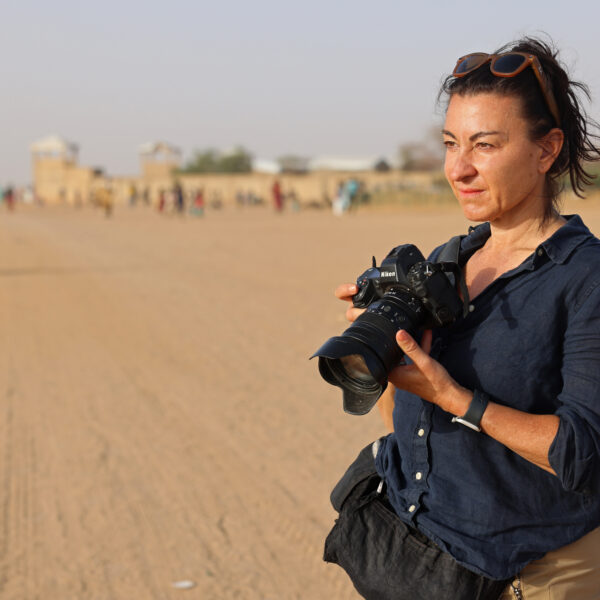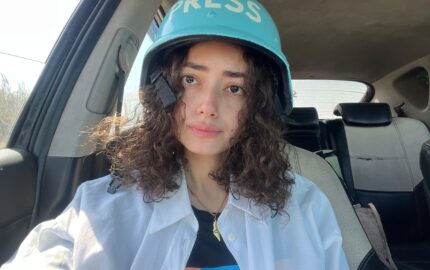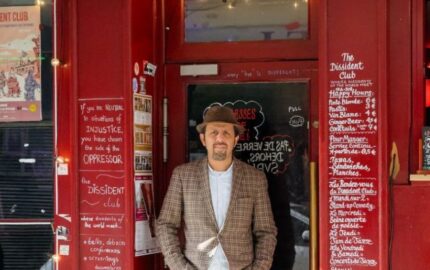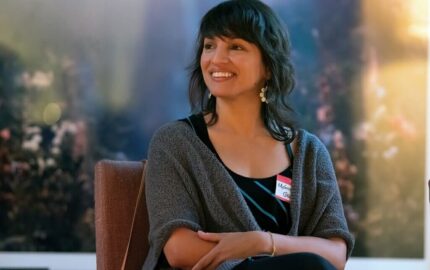Photojournalist Lynsey Addario was wrapping up an assignment in Kyiv, shortly after the start of Russia’s full-scale invasion of Ukraine in 2022, when she jumped into a car heading for the Polish border. She wasn’t racing toward her next assignment, however, but rushing to make it home to London in time for her son’s school concert.
The divide between Addario’s demanding career as a Pulitzer Prize-winning photojournalist — often working on the front lines of war or conflict — and her family life is at the heart of “Love+War,” a new documentary from National Geographic Documentary Films and co-directed by Chai Vasarhelyi and Jimmy Chin (“Free Solo”, “Nyad”). The film follows Addario as she crisscrosses the globe, from Ukraine, to Somalia, and even the Darién Gap in South America, while balancing the demands of motherhood and her partnership with Paul de Bendern, a former Reuters bureau chief whom Addario credits with shouldering many of the day-to-day responsibilities of raising their two young sons.
Colleagues and peers marvel throughout the film at Addario’s endurance: one interviewee remarks few conflict journalists last more than two decades in the field, and even fewer do so with such emotional fortitude. “Love+War” delves into the two times Addario was kidnapped on assignment, and the toll it took on her husband, parents, and sisters.
The film also lays bare the double standards she has faced as a woman and a mother in a male-dominated field. After the birth of her first child, Addario was repeatedly asked whether she planned to give up her profession — a question, she notes, that no one would ever ask a man. In one scene, she recalls an editor declaring: “There are just no women in the world good enough for The New York Times.”
But amid the gravity of her work, the film finds moments of humor and lightness. One night, following the chaos of bathtime and getting her sons ready for bed, Addario exclaims: “Kids are so much harder than war!”
Addario and Vasarhelyi spoke to Nieman Reports about the making of the film, the inequities women still face in journalism, and their approach to depicting Addario’s family and work. This conversation has been edited for length and clarity.
Nieman Reports: Chai, what drew you to covering not only Lynsey’s career, but also her personal life? Lynsey, tell us about how and why you got involved in the project.
Lynsey Addario: Chai and Jimmy approached me in late 2021. I had been approached before, but it never really felt like the right time. I wasn't ready to have someone following me around because of the implications it has on my own work and the subjects that I follow.
But then I kept seeing all these projects — both fiction and nonfiction — portraying war photographers, and they were often men. I was getting increasingly frustrated that it was seldom a woman in that role.
So then [Jimmy, Chai, and I] talked about what it would look like to have a documentary crew [follow me]. And then the war in Ukraine started … and The New York Times sent me, and I knew I would be embarking on a big story. It just felt like the timing was right.
Chai Vasarhelyi: I've been a longtime fan of Lynsey’s work. For me, like many of us, my understanding of the humanitarian crises and conflicts of the past 25 years have been shaped by her work.
I made my first film on Kosovo, and she was part of this group of pretty badass female journalists, including Samantha Power and Elizabeth Rubin, who are just a few years older than I am. [Lynsey has] been long on my radar.
I think a lot of people have wanted to tell Lynsey's story, and somehow, the timing was right for Lynsey and the fit was right for us.
NR: Lynsey, what was it like becoming the subject of someone else’s lens and telling your own story?
Addario: I do this for a living, so I knew what to expect in terms of what it would require to do a full picture, an authentic picture. It was really about opening my life and showing vulnerability, because I think it's important to be honest. It's not an easy life. It does mean my personal life suffers and my family suffers. There is a lot of fallout to this profession.
I wasn't surprised by the demands of being a subject of a documentary, just because this is also what I do with other people.
NR: “Love+War” explores the emotional and logistical challenges of balancing work that often takes you into conflict zones with being a parent. How do each of you think the journalism industry can better support journalists who are also caregivers — particularly mothers? What kind of questions or conversations should we be raising to make the field more fair and equitable?
Addario: I can just start by saying, when I got pregnant in 2011, after the kidnapping, I didn't tell anyone until I was 5½ months pregnant. I didn't want editors to not give me assignments or decide for me what was safe enough for me to do.
By the same token, I almost never talk about my children when I'm on assignment, because I don't want to be sidelined and don't want [anyone to think] “Oh, she can't do it anymore because she's a mother.”
There is a fair amount of sexism, it's just not out there [in the open]. That case with The New York Times editor was rare because he actually articulated what I knew for so long, which was kind of this aha moment. I think it’s just shocking to me that there are still so few women in this profession, 25 years after I started. I think we need to ask ourselves why — I don't know the answer to that.
On the photographer’s side, it's probably because of the physical and emotional demands, the fact that it is hard to have a personal life, and it is hard to have a family. If you do choose that [path], you need to have a partner who's fully present and willing to take the load of raising the children. I don't think there are that many men like that.
On the editor’s side, maybe they're not assigning as many women, but it's hard to say, because no one really admits to that. Everyone says we've come so far. But I think when you look at the concrete numbers of women actively working in war zones, it's still a fraction of men.
Vasarhelyi: I completely agree with Lynsey. Hollywood is incredibly sexist, and there are not that many women who have won [awards for] best director. It's just a fact.
I have walked into so many meetings where, especially being in a directing partnership, people look Jimmy in the eye and don't look me in the eye.
I'll never forget for “Free Solo,” I had dinner with the producer, and his wife joined us, and that's when I told them I was five months pregnant … and I was very clear, [I have to] do “Free Solo” in these two weeks, because I will not be available [after]. And he understood that.
I actually have more of a messiness to my professional life, because I'm very much like a single mom, where I don't have a partner who could support me. I lean very much on my family. I'm sure I've definitely gotten negative reactions to it. At the same time, I couldn't do both, unless I was candid about the messiness and that things are not as perfect as I'd like them to be, and that I run a three-ring circus at all times.
NR: Lynsey, you’ve spent a large part of your career covering war and its consequences. How has your understanding of war changed or transformed since the start of your career? At a time when war feels ever present in the news cycle, what do you wish more people — especially policymakers and civilians — understood about the realities you’ve witnessed?
Addario: When I first started covering war, I was very focused on the external — combat, bombings … the things that were like public-facing, whether they're protests or people lining up for food or propane, or getting money out of the banks, or looking for the missing in mass graves, things that were in public view.
What I've learned through the years is to focus on the hidden, the private, and how people are affected on the margins of war — but also in their homes. War has tentacles that extend everywhere, to places where you do not imagine war will affect. For me, it's very much about covering those stories that are unexpected.
Last year, I focused on a story on 6-year-old Sonya in Ukraine, who had retinoblastoma [a cancer of the eye]. Her chemotherapy was interrupted, and she died. I covered the last three months of her life. People don't think about children with long-term illnesses, disabilities, or PTSD. What does that do to a generation of youth?
I just wish leaders would take more consideration into the civilian toll, and how it's not just about the immediate — it's about the ripples of conflict, and when a country is destroyed, the infrastructure is destroyed, and every single person in that country is affected.
NR: Lynsey, how did it feel to see such intimate moments of family life portrayed on screen? How has your family reacted to the finished film?
Addario: It's hard for me to watch the film because, of course, it [captures] the fallout of all of my decisions on the people I love, so I feel guilty. I feel horrible about what I've put my children through, about the stress that I put my parents and my husband through. It's very difficult to watch the film, but I think that's a testament to the power of the film. I think that if it was soft-pedaling, then I wouldn't really care.
I think Paul comes across really well. He is happy with the film because he is, in some ways, the hero. He is the one who carries the load. He's Scandinavian, which is important to note, because [he comes from] a very egalitarian society where men get the same paternity leave as women. I think that for Paul, he doesn't question his masculinity or himself [when] he decided to be a full-time parent and let me work. But when people see the film, it's kind of shocking to see that role reversal. I think he was happy to see that.
My son, Lukas — I watched [the film] with him. He said the Libya section was very hard [to watch] because there was a lot he didn't know. He had been hearing about Ukraine since the start of the full-scale invasion, so it wasn't so surprising. I imagine in time, he will articulate more, but … [for] many people, it takes a while to process the film because it's intense.
NR: Chai, what surprised you the most about Lynsey during the filming process?
Vasarhelyi: I would say that this is one of my most personal films, because I was disarmed by how difficult I found working with the material of Lynsey’s children. It's hard for me not to see my own children.
I was impressed and really respected her candor. It takes great courage to do that, because it's so easy for the peanut gallery to judge.
I think that I [had] an idea that her character is uncompromising, but to see it and actually study it is different, because it's very impressive — the idea that she can acknowledge the price of bearing witness — especially in these times when everything seems so overwhelming, be it climate change, AI, totalitarianism — the work still matters, and that is a very hopeful place for me and I needed to spend time there.
“Love+War” is currently playing select theaters and available to stream on Hulu and Disney+



